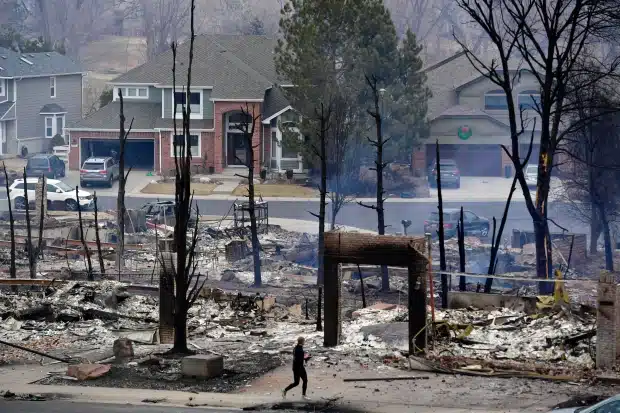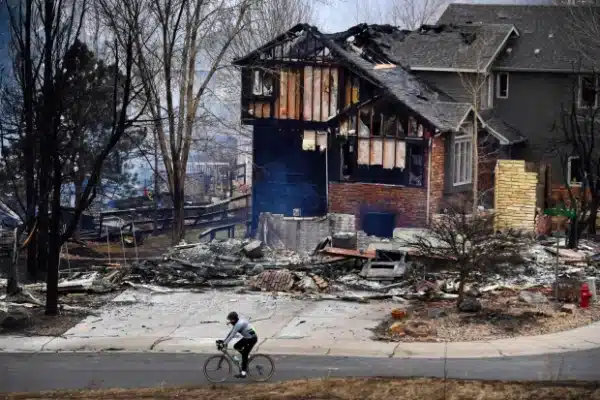
A man walks amid burned homes in the Coal Creek Ranch subdivision in the aftermath of the Marshall Fire in Louisville on Dec. 31, 2021. (Helen H. Richardson/The Denver Post)
Jessica Carson, a single mother of two who lost her Louisville home and everything in it during the Marshall Fire, never planned to sue her insurance company.
But after filing a claim with Nationwide for the personal belongings that she lost, which included the fatigues her father wore in Vietnam, her integrity was called into question.
A claims specialist quizzed her on why many of the belongings were fairly new before the fire and, after Carson explained that a recent divorce and weight loss necessitated new furniture and clothes, demanded 18 months of credit card and bank statements. Still dissatisfied, he sent her file to a fraud investigator. Carson’s claim still hasn’t been processed.
“I couldn’t sleep. I had to get prescribed sleep medications because all I could think about was, OK, how am I going to find receipts for all this stuff?” she said last week.
Due to the way she was treated, Carson sued Nationwide in November for the $121,000 that she said it owes her. The next month, she became the first Marshall Fire victim to completely rebuild her home. Inside it is some of the cheapest furniture she could find.
“I can feed my kids, but I can’t put money into their college savings,” Carson said in an interview. “I don’t have any surplus money at all. My savings is depleted.”
Nationwide’s lawyers deny that its investigation of Carson was unfounded or that it has caused her emotional distress. They say it was still investigating her claim when she sued.
Fifteen months after the most destructive wildfire in state history destroyed 1,100 homes in Boulder County, residents like Carson who had to repair or replace theirs continue to sue their insurers. At least 17 such lawsuits have been filed to date, including five in March 2023 alone.
At stake in the cases are tens of millions of dollars that sit in the bank accounts of insurers but may belong in the bank accounts of Boulder County property owners.
Most cases involve houses that were damaged by smoke and soot and insurance companies that are accused of not paying what they should have. Residents say it’s common for insurers to downplay the damage to their homes and the cost of making them habitable.

A man on a bike rides by burned homes in the Coal Creek Ranch subdivision in Louisville in the aftermath of the Marshall Fire on Dec. 31, 2021. (Helen H. Richardson/The Denver Post)
A Boulder woman estimated damage to her house at $411,000 but Farmers Insurance paid out $23,000. A Superior couple said smoke caused $967,000 in damage to their house and $406,000 in personal property loss, but State Farm paid $143,000. A Louisville couple with an asthmatic child say their claims were wrongly denied 15 times in one year.
Matthew and Melanie Fargo, whose Louisville house was 600 feet downwind from destroyed homes, hired a professional inventory firm that determined they lost $418,000 worth of personal property. Their insurance company, Nationwide, which didn’t inspect the home, put the loss at $37,000 instead, according to the Fargos. So, they sued in November.
In the highest-stakes case, Fresca Holding Co., which makes food products at two Louisville locations, said Hanover Insurance refuses to cover losses it suffered when it had to evacuate and stop operations due to the fire and a lack of safe drinking water. Fresca’s insurance policy covers up to $21 million in losses, according to an October lawsuit.
All of those cases were filed in Boulder County District Court but several have been moved to a federal court. Lawyers for the insurance companies deny wrongdoing in all cases.
In a half-dozen lawsuits, homeowners say that their policy provided far too little coverage.
“A common theme of the victims of the Marshall Fire is that an overwhelming majority of the homeowner victims were underinsured,” alleges a federal lawsuit filed March 17.
A couple in rural Boulder, Daniel and Wendy Wyss, who watched on a home camera from afar as the Marshall Fire torched their $1.8 million house, say their Farmers Insurance policy capped losses at $873,000. In November, they sued Farmers and their insurance advisor, who also helped them insure their 18 vehicles. The defendants deny doing anything wrong.
Timothy Campbell, the insurance advisor being sued in that case, said he used insurance industry software to estimate coverage limits and the software may be to blame.
Rona Schank and Amit Ginsburg say State Farm employees never stepped inside their 3,000-square-foot home in Louisville before underinsuring it. After the fire, they learned their damages and rebuilding costs exceeded their policy limit by $395,000, so they sued.
A month later, State Farm responded by saying, effectively, that limits are limits.
“Plaintiffs agreed to purchase the subject policy,” State Farm lawyers wrote to Judge Kenneth Plotz in Boulder, “knowing the amounts of the various coverage limits.”

A man walks amid burned homes in the Coal Creek Ranch subdivision in the aftermath of the Marshall Fire in Louisville on Dec. 31, 2021. (Helen H. Richardson/The Denver Post)
Jessica Carson, a single mother of two who lost her Louisville home and everything in it during the Marshall Fire, never planned to sue her insurance company.
But after filing a claim with Nationwide for the personal belongings that she lost, which included the fatigues her father wore in Vietnam, her integrity was called into question.
A claims specialist quizzed her on why many of the belongings were fairly new before the fire and, after Carson explained that a recent divorce and weight loss necessitated new furniture and clothes, demanded 18 months of credit card and bank statements. Still dissatisfied, he sent her file to a fraud investigator. Carson’s claim still hasn’t been processed.
“I couldn’t sleep. I had to get prescribed sleep medications because all I could think about was, OK, how am I going to find receipts for all this stuff?” she said last week.
Due to the way she was treated, Carson sued Nationwide in November for the $121,000 that she said it owes her. The next month, she became the first Marshall Fire victim to completely rebuild her home. Inside it is some of the cheapest furniture she could find.
“I can feed my kids, but I can’t put money into their college savings,” Carson said in an interview. “I don’t have any surplus money at all. My savings is depleted.”
Nationwide’s lawyers deny that its investigation of Carson was unfounded or that it has caused her emotional distress. They say it was still investigating her claim when she sued.
Fifteen months after the most destructive wildfire in state history destroyed 1,100 homes in Boulder County, residents like Carson who had to repair or replace theirs continue to sue their insurers. At least 17 such lawsuits have been filed to date, including five in March 2023 alone.
At stake in the cases are tens of millions of dollars that sit in the bank accounts of insurers but may belong in the bank accounts of Boulder County property owners.
Most cases involve houses that were damaged by smoke and soot and insurance companies that are accused of not paying what they should have. Residents say it’s common for insurers to downplay the damage to their homes and the cost of making them habitable.

A man on a bike rides by burned homes in the Coal Creek Ranch subdivision in Louisville in the aftermath of the Marshall Fire on Dec. 31, 2021. (Helen H. Richardson/The Denver Post)
A Boulder woman estimated damage to her house at $411,000 but Farmers Insurance paid out $23,000. A Superior couple said smoke caused $967,000 in damage to their house and $406,000 in personal property loss, but State Farm paid $143,000. A Louisville couple with an asthmatic child say their claims were wrongly denied 15 times in one year.
Matthew and Melanie Fargo, whose Louisville house was 600 feet downwind from destroyed homes, hired a professional inventory firm that determined they lost $418,000 worth of personal property. Their insurance company, Nationwide, which didn’t inspect the home, put the loss at $37,000 instead, according to the Fargos. So, they sued in November.
In the highest-stakes case, Fresca Holding Co., which makes food products at two Louisville locations, said Hanover Insurance refuses to cover losses it suffered when it had to evacuate and stop operations due to the fire and a lack of safe drinking water. Fresca’s insurance policy covers up to $21 million in losses, according to an October lawsuit.
All of those cases were filed in Boulder County District Court but several have been moved to a federal court. Lawyers for the insurance companies deny wrongdoing in all cases.
In a half-dozen lawsuits, homeowners say that their policy provided far too little coverage.
“A common theme of the victims of the Marshall Fire is that an overwhelming majority of the homeowner victims were underinsured,” alleges a federal lawsuit filed March 17.
A couple in rural Boulder, Daniel and Wendy Wyss, who watched on a home camera from afar as the Marshall Fire torched their $1.8 million house, say their Farmers Insurance policy capped losses at $873,000. In November, they sued Farmers and their insurance advisor, who also helped them insure their 18 vehicles. The defendants deny doing anything wrong.
Timothy Campbell, the insurance advisor being sued in that case, said he used insurance industry software to estimate coverage limits and the software may be to blame.
Rona Schank and Amit Ginsburg say State Farm employees never stepped inside their 3,000-square-foot home in Louisville before underinsuring it. After the fire, they learned their damages and rebuilding costs exceeded their policy limit by $395,000, so they sued.
A month later, State Farm responded by saying, effectively, that limits are limits.
“Plaintiffs agreed to purchase the subject policy,” State Farm lawyers wrote to Judge Kenneth Plotz in Boulder, “knowing the amounts of the various coverage limits.”
